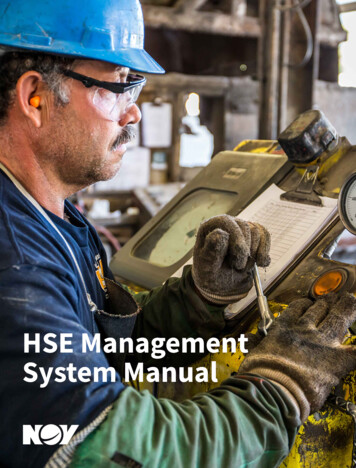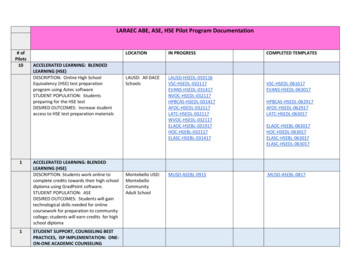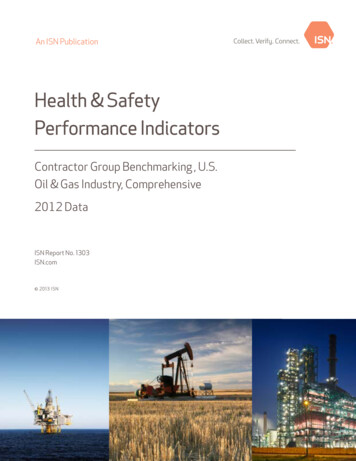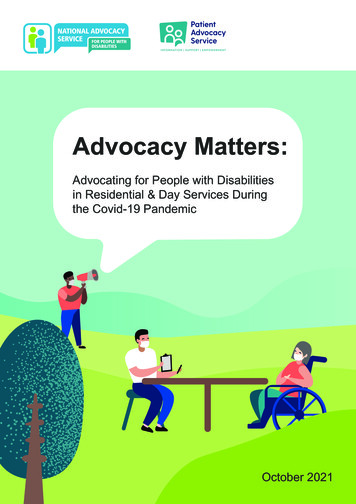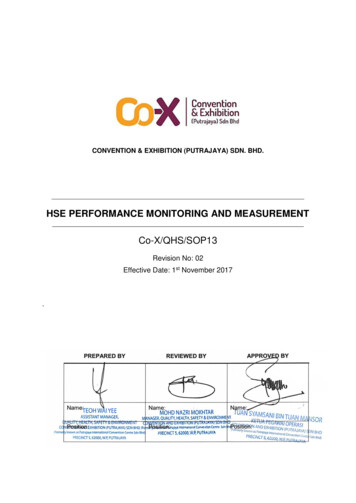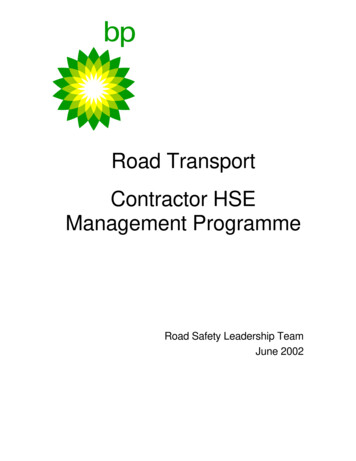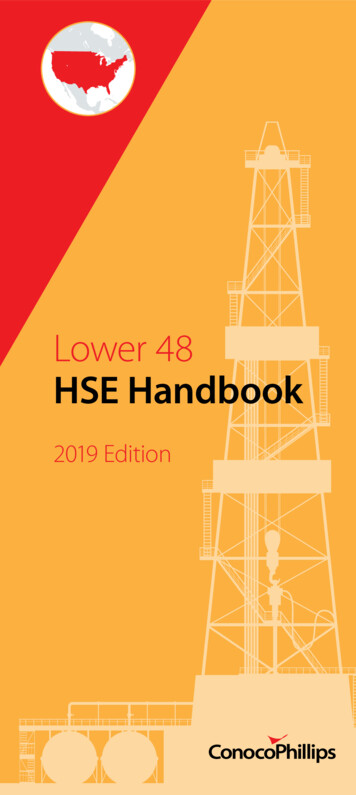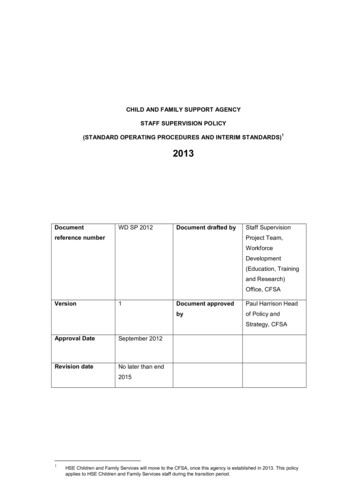
Transcription
CHILD AND FAMILY SUPPORT AGENCYSTAFF SUPERVISION POLICY(STANDARD OPERATING PROCEDURES AND INTERIM STANDARDS)12013DocumentWD SP 2012Document drafted byreference numberStaff SupervisionProject Team,WorkforceDevelopment(Education, Trainingand Research)Office, CFSAVersion1Document approvedPaul Harrison Headbyof Policy andStrategy, CFSAApproval DateSeptember 2012Revision dateNo later than end20151HSE Children and Family Services will move to the CFSA, once this agency is established in 2013. This policyapplies to HSE Children and Family Services staff during the transition period.0
National Child and Family Support Agency Staff Supervision PolicyIntroduction . 2Part 1Child and Family Support Agency Staff Supervision Policy . 31.0Policy Statement and Definition . 42.0Purpose of this Policy. 53.0Scope of this Policy. 54.0Function and Aims of Supervision . 55.0Core Values and Principles of this Policy . 66.0Review of this Policy . 7Part 2Standard Operating Procedures for CFSA Staff Supervision(Social Work and Social Care) 81.0Roles and Responsibilities . 92.0Frequency and Duration of Supervision. 113.0Supervision and its Relationship to Other Processes. 114.0Supervision Contracts . 115.0Confidentiality of Supervision. 126.0Recording of Supervision Sessions . 127.0Records of Differences of Opinion regarding Decisions . 138.0Resolving Disputes within Supervision . 139.0Unresolved Differences. 1410.0Ending and Transitioning Supervision Arrangements. 1411.0Training to Support Supervision. 1412.0Review of the Supervision Process . 1413.0Quality Assurance of Supervision . 15Part 3Interim CFSA Standards for Staff Supervision (Social Work and Social Care). 16AppendicesAppendix I - Glossary of Terms and Definitions:. 25Appendix II - Legislation/other related policies: . 26Appendix III - Pro Forma: Supervision Contract Guidance:. 31Appendix IV - Pro Forma: A specimen contract for Supervision. 32Appendix V - Pro Forma: Schedule of Supervision Meetings. 34Appendix VI - Pro Forma: Supervision Record for Staff File . 35Appendix VII - Pro Forma: Supervision Record for Child's File . 36Appendix VIII – Audit Tool. 371
IntroductionPart 1 of this document is a review of the Children and Family Services Staff Supervision Policy(HSE, 2009). This relates to all staff of the Child and Family Support Agency (CFSA).Part 2 outlines standard operating procedures for social work and social care staff transferring to theCFSA in 2013.There has been targeted consultation on this documentation with the following reference groups Nominees of HSE Children and Family Services principal social workers. Nominated social care professionals. The Staff Practice Subgroup of the National Advisory Group for HSE Children andFamily Services Workforce Development (Education, Training and Research).Standards for supervision based on clear criteria are required to ensure that the quality of2supervision meets an approved standard (HIQA, 2012) . Part 3 includes a set of Interim3Standards drawn from best practice in this area to support the implementation and monitoring ofsupervision within CFSA. The Interim Standards have been adapted to the Irish context.Consultation with practitioners on these standards will be undertaken as part of theimplementation process and the review of the policy.2Standard 5:3: National Standards for the Protection and Welfare of Children For Health Service Executive Children andFamily Services, HIQA, July 20123Adapted from the Supervision Standards and Criteria, Regional Policy for Northern Ireland Health and Social CareTrusts, Department of Health, Social Services and Public Safety (N.I.) 20082
Part 1Child and Family Support Agency Staff Supervision PolicyTraininpervisuSS kiion llsg3
1.0Policy Statement and Definition1.1This policy relates to all staff working within the Child and Family Support Agency (CFSA).1.2It is CFSA policy that all social workers and social care workers will receive supervision4from within their line management structure as per the procedures provided with this policydocument (Part 2).1.3Within this policy, supervision is defined as “A process in which one worker is givenresponsibility to work with another worker(s) in order to meet certain organizational,professional and personal objectives. These objectives are competent, accountableperformance, continuing professional development and personal support”. (Harries –1987).1.4This model of supervision requires the integration of line management, clinical andprofessional supervision as a responsibility delegated to the direct line manager.1.5This policy requires the primary method of provision of supervision to be through regularindividual sessions.1.65Staff supervision supports the overall management of worker performance. The diagrambelow shows where staff supervision fits with other systems and tools that contributes tooverall management of worker performance in the agency.6Clear Discipline CodeStaff Care ResourceAgency Performance Management SystemTraining Based on Workforce PlanningPersonal Development Planning (PDP) ProcessSTAFF SUPERVISIONClear Standards and Competencies for RolesProfessional Codes to Guide PracticeClear Policies and Practice GuidanceEffective Induction to values and goals of the AgencyAppropriate recruitment and selectionAdapted from Morrison (2005)45‘Policy’ refers only to Part 1 only of this documentConsideration needs to be given to other methods of staff supervision such as group and peer supervision but theseare outside the scope of this policy for now.6As a Performance Management System is developed for CFSA, Supervision will be further integrated within thisframework.7Morrison, T. (2005). Staff supervision in social care: making a real difference for staff and service users. Brighton:Pavilion47
2.0Purpose of this Policy2.1The purpose of this policy is to ensure that all CFSA staff members receive consistent andeffective Supervision.3.0 Scope of this Policy3.1This is a mandatory policy for all CFSA staff. Standard Operating Procedures have beendeveloped to ensure that the policy can be implemented fully for all social work and socialcare staff. These SOPs and pro forma templates can be applied to other staff groupings asappropriate.4.0Function and Aims of Supervision4.1Supervision provides a regular, structured, opportunity to discuss work, review practice andprogress and plan for future development.4.2Supervision has the four distinct but equally important functions of Management, Support,Learning/Development and Engagement/Mediation. Management to hold the worker accountable for performance and practice, toensure safe, quality care for children and families. Support for the individual staff member in what is a demanding and potentiallystressful working environment. This may involve debriefing which addresses theemotional impact of such work. Learning and development of each individual to identify their knowledge-base,attitudes, learning style and skills; to identify learning needs and the strengths andweaknesses of the worker; and to plan and set targets for ongoing development. Engagement/Mediation to ensure healthy engagement with and communicationbetween the individual and the organisation.Effective supervision will ensure that each function receives attention over time.4.3The aims of staff supervision in the CFSA are to provide oversight of direct work with children and families. to ensure staff members know what is expected of them by the agency. to ensure staff members carry out their duties effectively and efficiently. to ensure good practice and to challenge and manage poor practice. to ensure that health and well-being at work issues are addressed. to develop workers’ skills in and capacity for reflective practice.5
to assist in the continuous professional development (CPD) of staff. to ensure that staff members operate in an anti-discriminatory way and in linewith Professional Codes of Practice.4.4Staff supervision operates alongside many other professional, management and practicemeetings and processes. While these may over-lap and complement each other,Supervision is NOT counselling formal appraisal mentoring or coaching consulting formal disciplinary or grievance processes.89It should be noted that while staff supervision may identify issues that require referral to orinitiation of any of the above, it is the responsibility of the supervisor to ensure theseprocesses are dealt with in a separate forum.5.0Core Values and Principles of this Policy5.1These are the core values which underpin the Staff Supervision Policy and StandardOperating Procedures: Supervision must always put the needs of children first. The quality of supervision has a direct bearing on the quality of service delivery andoutcomes for children and families. Effective supervision contributes to the management of risk in relation to children,families, staff and the agency. Supervision should affirm and develop the highest standards of worker performance,while identifying and addressing issues of under-performance. Supervision must ensure the balanced and effective management of staff practice;development and support of staff and promote their engagement with theorganisation. All staff members have individual responsibility for the quality of their own work. All staff should prepare for and make a positive contribution to the supervisoryprocess.89Where formal appraisal exists, supervision will inform the appraisal processDisciplinary and grievance issues may initially surface and be addressed in Supervision. Records of Supervisionsessions may become relevant as part of disciplinary and grievance processes. However, it is essential that thesupervisor and/or manger with responsibility for initiating disciplinary process manage the transition from Supervisionto this arena.6
Senior managers have responsibility to promote effective supervision byimplementing this policy and ensuring training is provided for both supervisors andsupervisees. Senior managers need to conduct regular audits to ensure that this policy, standardoperating procedures, related standards and criteria are being implemented. Supervision must promote anti-discriminatory practice. All practice must be consistent with the relevant legislation and statutory instrumentsthat apply to health and social care professionals.6.0Review of this Policy6.1This policy will be reviewed by end 2015 or at an earlier date if so required by CFSAManagement.7
Part 2Standard Operating Procedures for CFSA Staff Supervision(Social Work and Social Care)TraininpervisuSS kiion llsg8
These standard operating procedures should be read and applied with reference to theNational Child and Family Support Agency Staff Supervision Policy (2013). While thesestandard operating procedures have been developed to direct practice in social work andsocial care professions, they provide a framework of best practice that can be appliedwithin other professions and service areas.1.0Roles and Responsibilities1.1General Responsibilities Each line manager has responsibility for ensuring compliance with the National Childand Family Support Agency Staff Supervision Policy (2013) and all relevantstandards and procedures, by all staff under his/her remit.1.2CFSA Responsibilities: The Agency is responsible for the creation and promotion of a climate in which supervision can be introduced,developed, monitored and evaluated. making supervision a core function of child welfare and protection services, andensuring that the process of supervision is recognised, supported and resourced. providing appropriate resources to enable staff and managers at all levels participatein the activity of supervision and in training to support this. ensuring that all grades of staff, including supervisors, have access to supervision. identifying, acknowledging and providing for external supervision where appropriate. ensuring that the process of implementation, evaluation and review of the policy isfacilitated and that this includes mechanisms for consultation with all partiesinvolved.1.3Supervisor Responsibilities: As a supervisor, you have responsibility to ensure that in conjunction with the supervisee, the supervisee’s supervision needs are identifiedand addressed; while at the same time having regard to organisational objectives. while you may delegate to or collaborate with others in addressing the supervisee’ssupervision needs, you maintain overall responsibility for the process. In suchsituations there must be agreement between you as the line manager, thesupervisee and the person to which the supervision task has been delegated, toagree how feedback will be managed. there is an overall equal emphasis on each of the four functions of supervision;bearing in mind that the emphasis on each may change from session to session.9
Supervision is considered a priority and that appropriate arrangements are put inplace to facilitate the process. If there are identified regular difficulties in delivering onsupervision, a contingency plan needs to be agreed and implemented in consultationwith the next line manager. supervisees comply with relevant professional standards, codes and legislation.Where it is apparent that a supervisee is in breach of such standards, codes orlegislation, you have a responsibility to his/her/your profession to identify such issuesto the supervisee and may have to refer to other processes outside of supervision. supervisees comply with relevant CFSA policies. Where it is apparent that asupervisee is in breach of such policies, you have a responsibility to identify suchissues to the supervisee and may have to refer to other processes outside ofsupervision.1.4Supervisee Responsibilities: As a supervisee you have a responsibility to ensure that you are proactive in getting the support you need to do your work. you seek clarification regarding your role and ways of working. you take responsibility for your personal and professional development. you prepare for supervision, give and accept constructive feedback. you implement agreements and plans as agreed. you communicate to the supervisor when supports are needed or when you findyourself unable to complete tasks. you take responsibility for your own performance you engage proactively in supervision under your professional code of ethics, inorder to maintain registration.10
2.0Frequency and Duration of Supervision2.1The frequency and duration of supervision sessions will vary according to the role andneeds of the individual supervisee however, the minimum standard for the followinggroups is: Social workers and social care workers on probationary year – Every 2 weeksfor the first three months after appointment. Every 4 weeks for remainder ofprobation. All other grades of social work and social care staff- Every 4-6 weeks2.2Individual supervision sessions should ordinarily be of 1.5 to 2 hours in duration.2.3The supervisor has responsibility to ensure that time is kept free from interruptions.Cancellation of supervision should only be in exceptional circumstances as it should beseen as a priority for both parties. If a cancellation is made the supervisor and superviseeshould immediately set a new date and time for supervision.3.0Supervision and its Relationship to Other Processes3.1While the policy indicates the requirement for individual one-to-one supervision, thecontribution of other forms of supervisory activity cannot be underestimated. These eventsmay be planned or ad hoc, formal or informal, individual or as part of a team. Exampleswould beoseeking advice or support by telephone.opreparatory work when dealing with a particularly challenging situation.ocase management reviews on one-to-one or team basis.odebriefing following a critical/significant incident.ostaff meetings and handover briefings at change of shift.Different service models and roles shape the overall requirements and opportunities forsuch events. However, it is essential that individual supervision sessions allow for a fulland effective integration of learning, accountability and support from all such processes.3.2Supervision operates as a key forum for reviewing caseloads.10Tools and guidance tosupport the caseload management process are currently being developed under thecaseload management project. These tools will be of use across Children and Familysocial work services and will support the social worker in reflecting on their process as adeveloping practitioner.4.011Supervision Contracts102.10.2 National Standards for the Protection and welfare of Children, HIQA, July 2012 states as follows: There aredefined manageable caseloads for all social workers which are reviewed on an ongoing basis to ensure best outcomesare achieved for children and families’.11The pilot phase of this project is due to be completed by the end of Q 2 2013.11
4.1All supervision relationships must be based on clarity of purpose, shared understanding ofresponsibilities, trust and honesty. Such foundations require time and effort. A formal,written supervision contract is the best demonstration of commitment to supervision andsuch should be developed for all supervision relationships.4.2All supervision contracts must clearly state the frequency, purpose, venue, and duration ofsupervision sessions.4.3All supervision contracts must demonstrate that supervision is a two-way process and mustinclude expectations and commitments from both those giving and receiving supervision.This should outline their responsibilities in making supervision effective, includingpreparation for supervision, sharing information, and actively contributing.4.4All supervision contracts should be signed by both supervisor and supervisee, with anidentified date for review of the contract.4.5A pro forma contract is provided as Appendix IV.5.0Confidentiality of Supervision5.1Supervision should take place as a private meeting; however, confidentiality cannot beabsolute. There may be circumstances in which matters discussed in supervision mayappropriately be brought to others. For example, the supervisor may feel the necessity tobring issues raised in supervision to the attention of the next line manager. In suchcircumstances, it is incumbent upon the supervisor to first advise the supervisee of theirintention to take such action.6.0Recording of Supervision Sessions6.1Supervision should always be recorded in a timely manner and in such a way that thecontent and decisions can be readily understood and audited. Supervision records are heldon the staff file in a separate, removable, section.6.2In general, there should be records at three distinct levels of recording1. Schedule of Supervision Meetings: This schedule should provide information ondates, times, details of cancellations etc of supervision meetings and should be heldby the supervisor as part of the supervisee’s supervision file. A pro forma record isprovided as Appendix V.2. Record of Supervision Meetings: A written record summarising the main pointsdiscussed in supervision should be maintained by the supervisor with a copyprovided to the supervisee. There should be a clear indication of who is responsiblefor actions to be undertaken, with specified time-scales as appropriate. Where otherpersonnel are providing aspects of supervision, it is the responsibility of thesupervisor to seek feedback and have this recorded appropriately. Similarly, the12
specific contribution of other supervision formats and events should be noted andrecorded as relevant. A pro forma template is provided as Appendix VI3. Case Supervision Record: Where workers hold a client caseload, it is thesupervisee’s responsibility to record any case-related decisions on the client casefile. They should make it clear with whom they have consulted, especially if adecision is made outside formal supervision or involves another manager. Pro formarecords are provided as Appendix VII6.3All notes should be signed as agreed records at the end of a session or beginning of thenext. Personal information will only be recorded where it is impacting on the individual’swork performance. This impact and action taken should be recorded in the supervisionnotes.6.4All supervision records are the property of the CFSA and, as such, may be subject to thesame disclosure under Freedom of Information, Data Protection and Complaints processesas any other CFSA records. They may also be accessed as part of an inspection ormonitoring process.6.5Other parties that may have access to supervision documentation include HIQA Inspectors and monitors of services HR personnel in the event of grievance or disciplinary procedures Legal services where documents are sought under discovery. Various forms of Enquiries Professional Practice Hearings7.0Records of Differences of Opinion regarding Decisions7.1At times when the supervisor and supervisee disagree on the recording of the meeting oron decisions reached within supervision, these differences need to be identified and signedby both parties within the supervision record.8.0Resolving Disputes within Supervision8.1If difficulties arise in the supervisory relationship, within the context of supervision, thesemust be acknowledged and addressed by both parties. If issues remain unresolved, eitherparty can inform the next line manager and a separate meeting can be arranged to addressthe issues under dispute. The next line manager will either facilitate this meeting or appointan independent person to act as mediator and make every effort to resolve the issue.8.2At this point, it could be agreed without blame that the supervision relationship is nottenable. Where named and agreed, line managers should endeavour to delegate thesupervision responsibility to a different staff member.13
9.0Unresolved Differences9.1Unresolved differences may need to be addressed through the separate Grievance andDisciplinary Procedures. Clearly, differences may also arise that are unrelated to thesupervision process and these too, if unresolved, should be addressed through Grievanceand Disciplinary procedures. Such issues should be regularly monitored by line managers.10.0 Ending and Transitioning Supervision Arrangements10.1 The ending of a supervision relationship and the transition to a new supervisor orsupervisee should be managed in a manner that respects the integrity of the supervisionprocess while ensuring that there is some continuity of progress for service users, staff andthe organisation.10.2 Ideally, the transition from one supervisor to another should be managed by way of a threeway meeting between them and the supervisee. This will protect the integrity of thesupervision relationship while ensuring that outstanding issues are carried forward.10.3 When one or other party of a supervision relationship moves, the supervision recordsshould be sealed and maintained within the supervisee’s file. It would generally beinappropriate for a new supervisor to access these records. There should be agreementbetween the supervisor and supervisee about what information will transfer to the newsupervisor.10.4 In many cases it may be more practical for the supervisor and supervisee to jointly generatean End of Supervision Report which would be passed to the incoming supervisor. Thisreport would identify those issues that require continuity.11.0 Training to Support Supervision11.1 Access to training should be provided to all those involved in the provision of supervision.This should address the principles of supervision as well as skills and techniques, havingregard to the experience and expertise of the supervisor.11.2 Supervisors should be provided with opportunities to refresh or further develop theirunderstanding and skills in supervision, through training or other processes.11.3 Supervisees must also be provided with training on the purpose and function of supervision.12.0 Review of the Supervision Process12.1 The supervisor and supervisee should undertake a planned review of the process andcontent of supervision at least once per year. This is to ensure that the process remainsfocused and in keeping with its stated objectives. The original supervision contract shouldbe reviewed at this time and amended as required.14
13.0 Quality Assurance of Supervision13.1 Managers of services should ensure that an audit of supervision within their remit isundertaken on a yearly basis. This should include a random review of Supervision contracts. Records of supervision sessions. Records of Staff training in the process of supervision.An audit tool is provided in Appendix VII to support managers in auditing against the interimstandards in Part 3.15
Part 3Interim CFSA Standards for Staff Supervision(Social Work and Social Care)TraininpervisuSS kiion llsgAdapted from the Supervision Standards and Criteria, Regional Policy for Northern IrelandHealth and Social Care Trusts, Department of Health, Social Services and Public Safety(N.I.) 200816
Standard 1Supervision is mandated, supported and resourced by management within the agency.Criteria: Supervision is named within employment contracts as a core responsibility of all agencymanagers. There are agreed arrangements for the provision of supervision to all social work andsocial care staff regardless of grade. Senior managers ensure that services are adequately resourced to ensure thatsupervisors do not have excessive numbers of staff to supervise. No supervisor is required to supervise more than 8 supervisees on an on-going basis. Supervisors and supervisees are provided with time and other resources to enableeffective engagement in supervision. There are appropriate supports for issues that arise in supervision but may requireadditional interventions e.g. critical incident debriefing, staff counselling, occupationalhealth, training, HR and employee relations.Standard 2All staff members are provided with formal and regular supervision.12Criteria: During their first 3 months of employment staff should receive supervision every 2 weeks. For the remainder of the probationary period, staff should receive supervision every 4weeks. Following confirmation in post, practitioners receive formal supervision, as a minimum, at4-6 weekly intervals. The individual supervision needs of staff members who are promoted, transfer to a newservice role or return from extended leave should be assessed within at least 2 weeks oftransition and the requirement for more frequent supervision considered. A supervision session lasts on average between 1.5 to 2 hours. In addition time will beneeded for preparation and recording.12The frequencies stipulated in this standard assume workers are in full-time employment. There may need to beadjustment where staff members are employed part-time.17
Standard 3Supervision is arranged and conducted in such a way as to permit proper reflection anddiscussion.Criteria: Supervision is not subject to cancellation and is only postponed in exceptionalcircumstances. Any postponed session is reconvened at the earliest opportunity. Where the supervisor is absent long-term from work (because of e.g. sick leave)alternative arrangements should be made by senior management to provide supervision. Supervision takes place in an environment which affords privacy and wherearrangements have been made to avoid interruptions (other than in circumstancesdescribed in the supervision agreement). Supervisors should follow the service specific protocols for staff debriefing followingparticular interventions and incidentStandard 4All supervisory relationships are subject to a written supervision contract t
5.0 Core Values and Principles of this Policy 5.1 These are the core values which underpin the Staff Supervision Policy and Standard Operating Procedures: Supervision must always put the needs of children first. The quality of supervision has a direct bearing on the quality of service delivery and outcomes for children and families.
